BMP6017 - Directors and Shareholders: Professionals in Practice
VerifiedAdded on 2023/06/05
|17
|1056
|223
Presentation
AI Summary
This presentation explores the roles and powers of directors, including their appointment, qualifications, duties, and relationship with auditors, as governed by the Companies Act 2013. It also examines shareholders' rights and obligations, share capital, and their relationship with directors. Furthermore, it discusses alternative methods of raising capital, such as retained earnings, debt capital, and equity capital. The presentation concludes that both directors and shareholders play crucial roles in achieving the goals and objectives of a company, with directors ensuring smooth processes and shareholders contributing to capital growth. Desklib offers more resources for students.
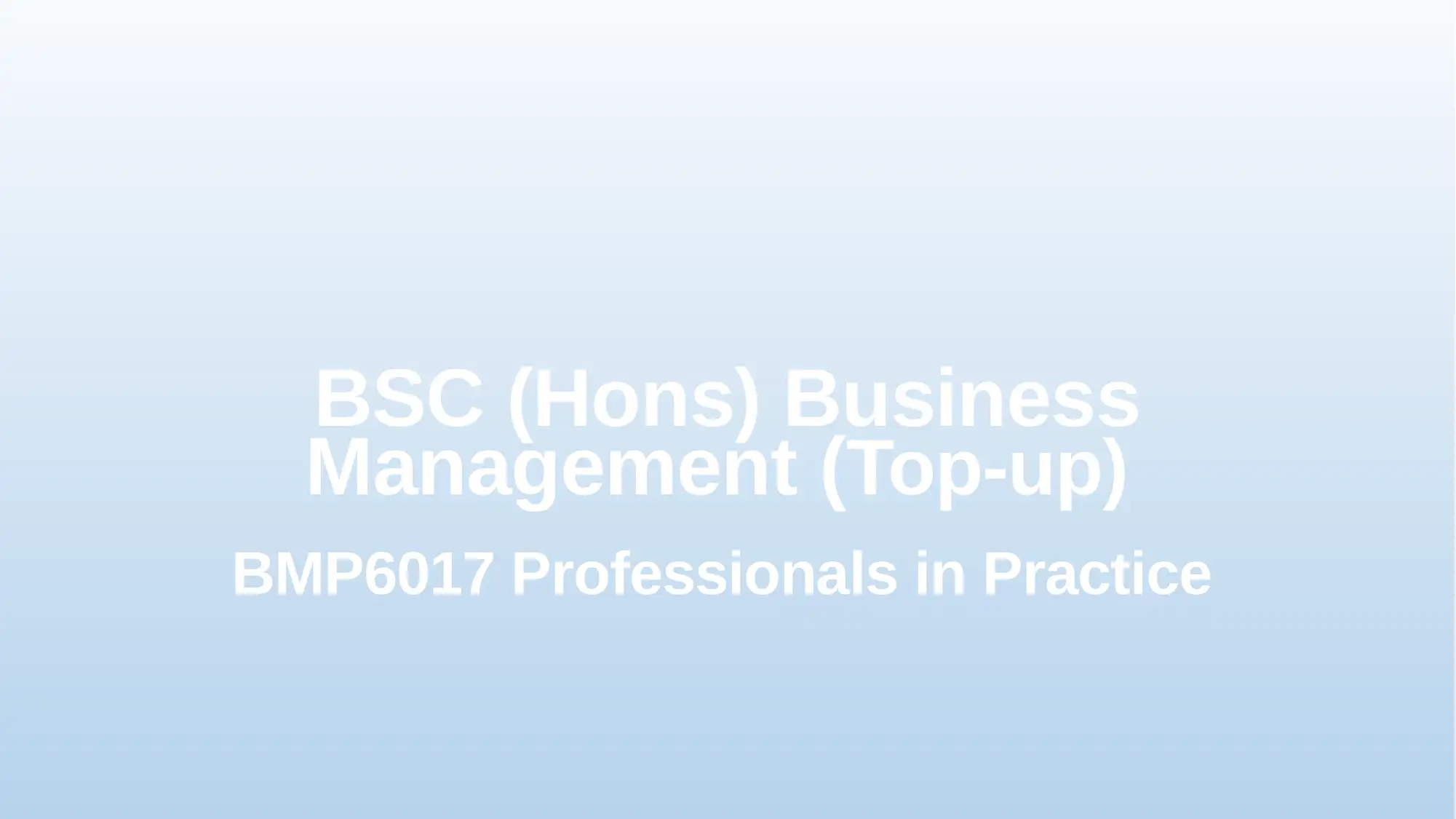
BSC (Hons) Business
Management (Top-up)
BMP6017 Professionals in Practice
Management (Top-up)
BMP6017 Professionals in Practice
Paraphrase This Document
Need a fresh take? Get an instant paraphrase of this document with our AI Paraphraser
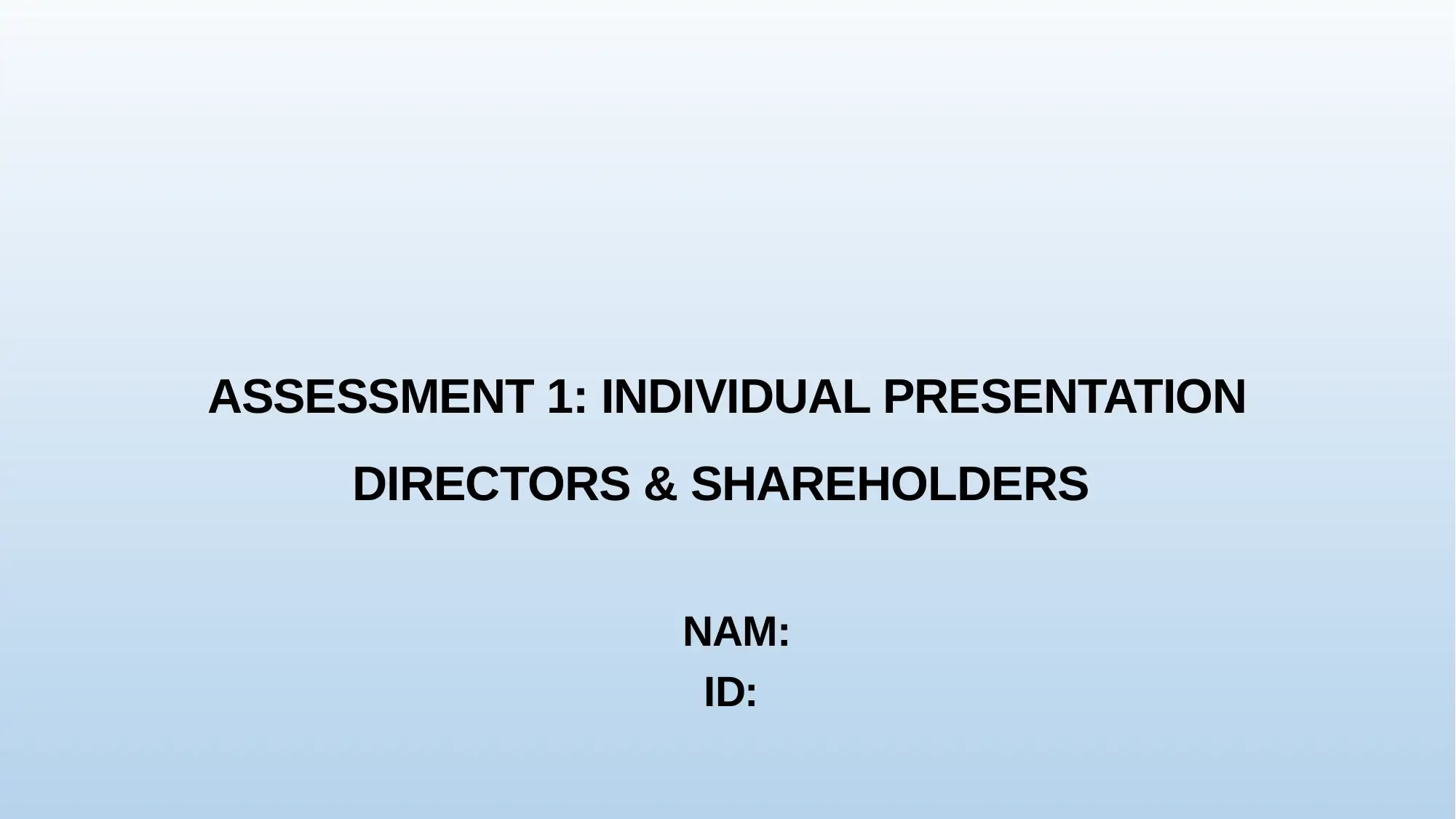
ASSESSMENT 1: INDIVIDUAL PRESENTATION
DIRECTORS & SHAREHOLDERS
NAM:
ID:
DIRECTORS & SHAREHOLDERS
NAM:
ID:
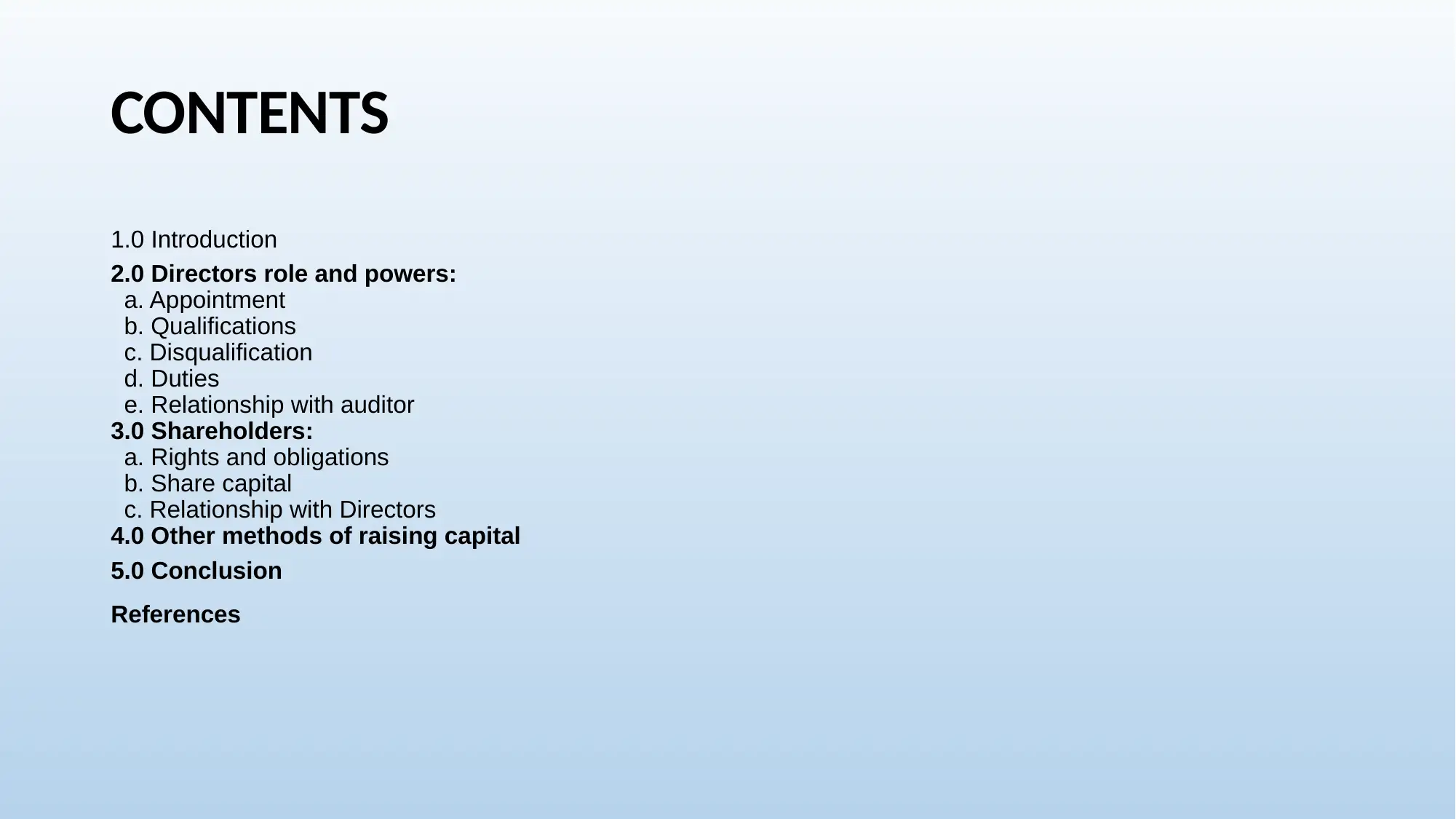
CONTENTS
1.0 Introduction
2.0 Directors role and powers:
a. Appointment
b. Qualifications
c. Disqualification
d. Duties
e. Relationship with auditor
3.0 Shareholders:
a. Rights and obligations
b. Share capital
c. Relationship with Directors
4.0 Other methods of raising capital
5.0 Conclusion
References
1.0 Introduction
2.0 Directors role and powers:
a. Appointment
b. Qualifications
c. Disqualification
d. Duties
e. Relationship with auditor
3.0 Shareholders:
a. Rights and obligations
b. Share capital
c. Relationship with Directors
4.0 Other methods of raising capital
5.0 Conclusion
References
⊘ This is a preview!⊘
Do you want full access?
Subscribe today to unlock all pages.

Trusted by 1+ million students worldwide
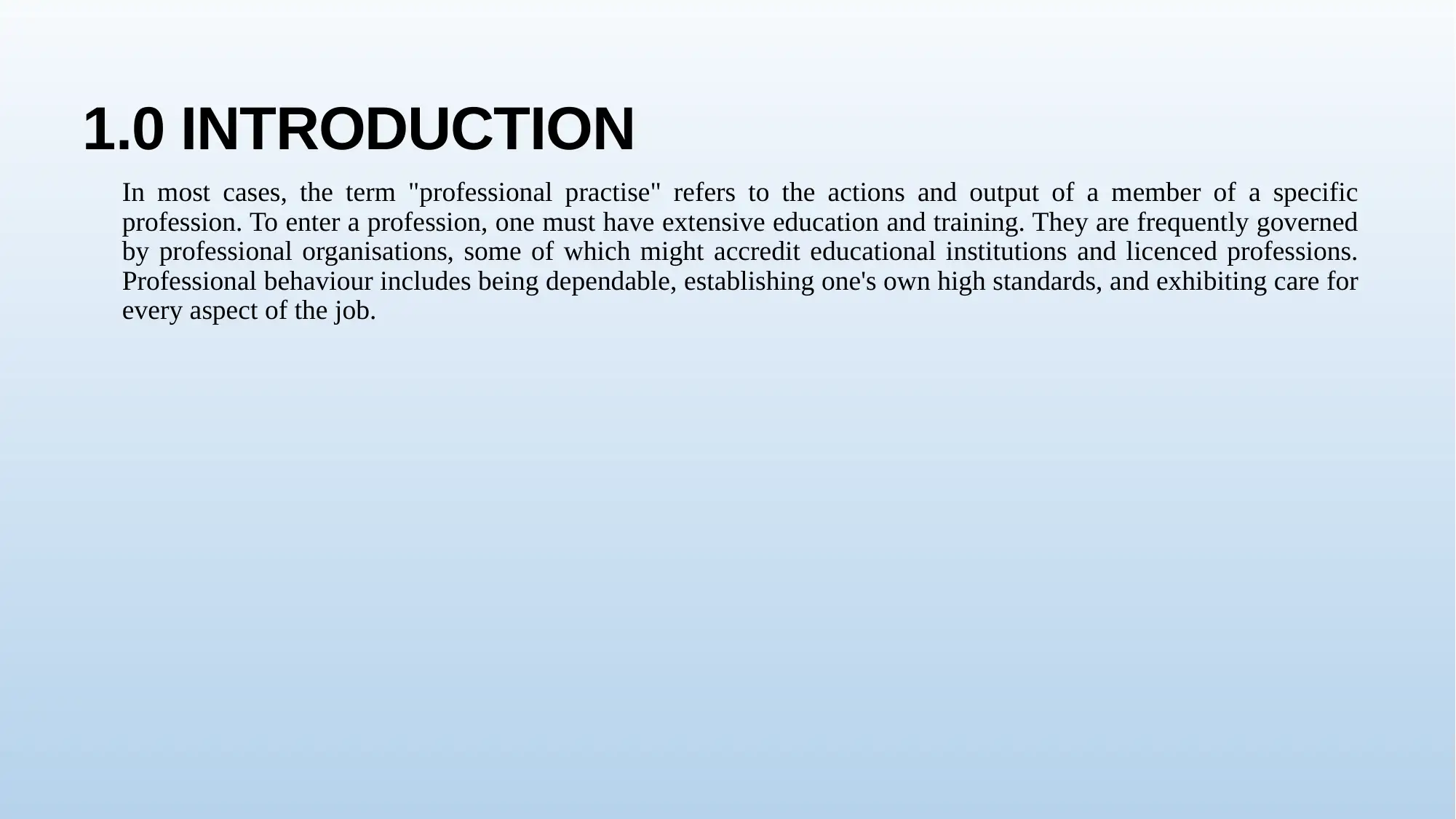
1.0 INTRODUCTION
In most cases, the term "professional practise" refers to the actions and output of a member of a specific
profession. To enter a profession, one must have extensive education and training. They are frequently governed
by professional organisations, some of which might accredit educational institutions and licenced professions.
Professional behaviour includes being dependable, establishing one's own high standards, and exhibiting care for
every aspect of the job.
In most cases, the term "professional practise" refers to the actions and output of a member of a specific
profession. To enter a profession, one must have extensive education and training. They are frequently governed
by professional organisations, some of which might accredit educational institutions and licenced professions.
Professional behaviour includes being dependable, establishing one's own high standards, and exhibiting care for
every aspect of the job.
Paraphrase This Document
Need a fresh take? Get an instant paraphrase of this document with our AI Paraphraser
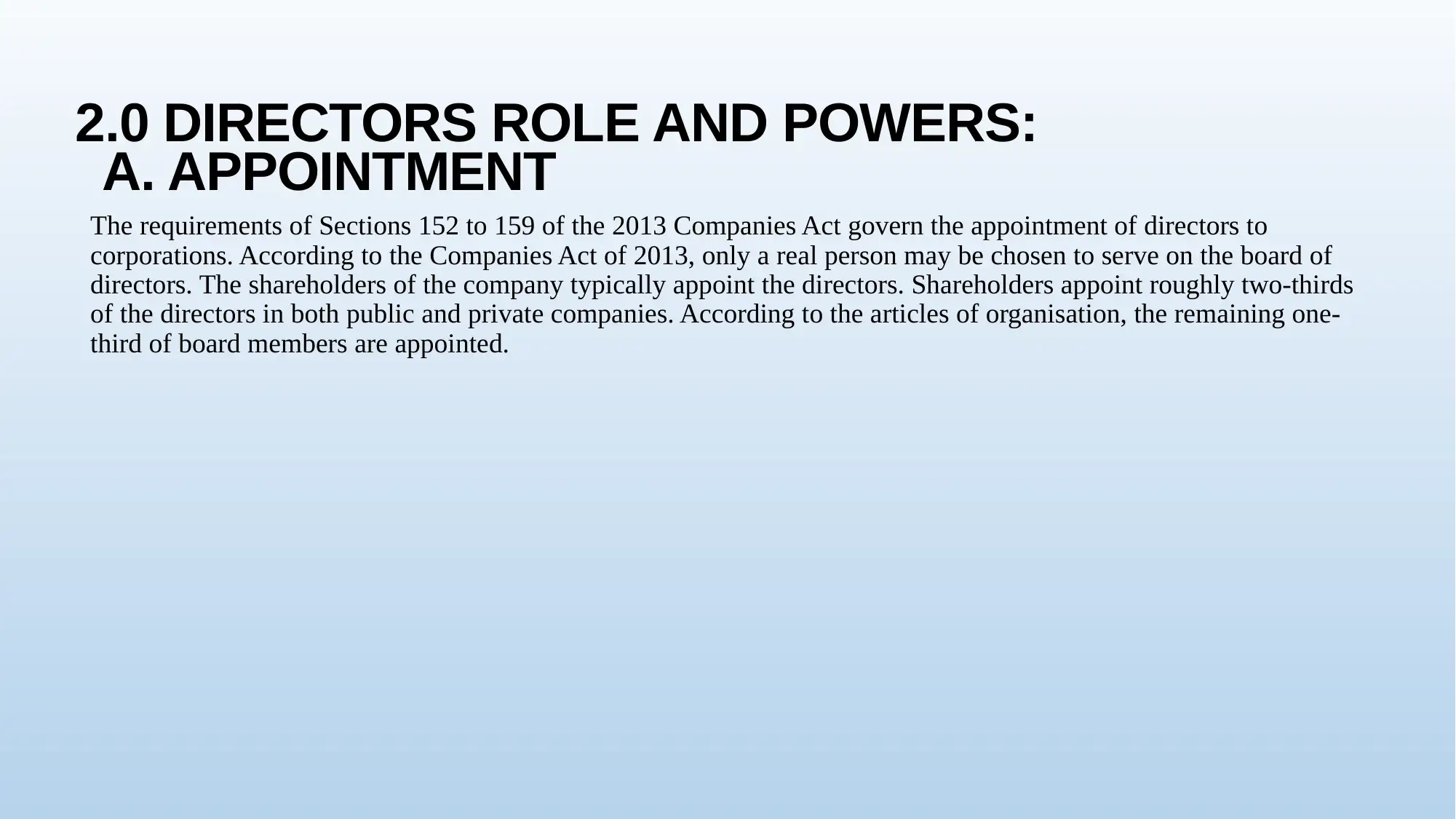
2.0 DIRECTORS ROLE AND POWERS:
A. APPOINTMENT
The requirements of Sections 152 to 159 of the 2013 Companies Act govern the appointment of directors to
corporations. According to the Companies Act of 2013, only a real person may be chosen to serve on the board of
directors. The shareholders of the company typically appoint the directors. Shareholders appoint roughly two-thirds
of the directors in both public and private companies. According to the articles of organisation, the remaining one-
third of board members are appointed.
A. APPOINTMENT
The requirements of Sections 152 to 159 of the 2013 Companies Act govern the appointment of directors to
corporations. According to the Companies Act of 2013, only a real person may be chosen to serve on the board of
directors. The shareholders of the company typically appoint the directors. Shareholders appoint roughly two-thirds
of the directors in both public and private companies. According to the articles of organisation, the remaining one-
third of board members are appointed.
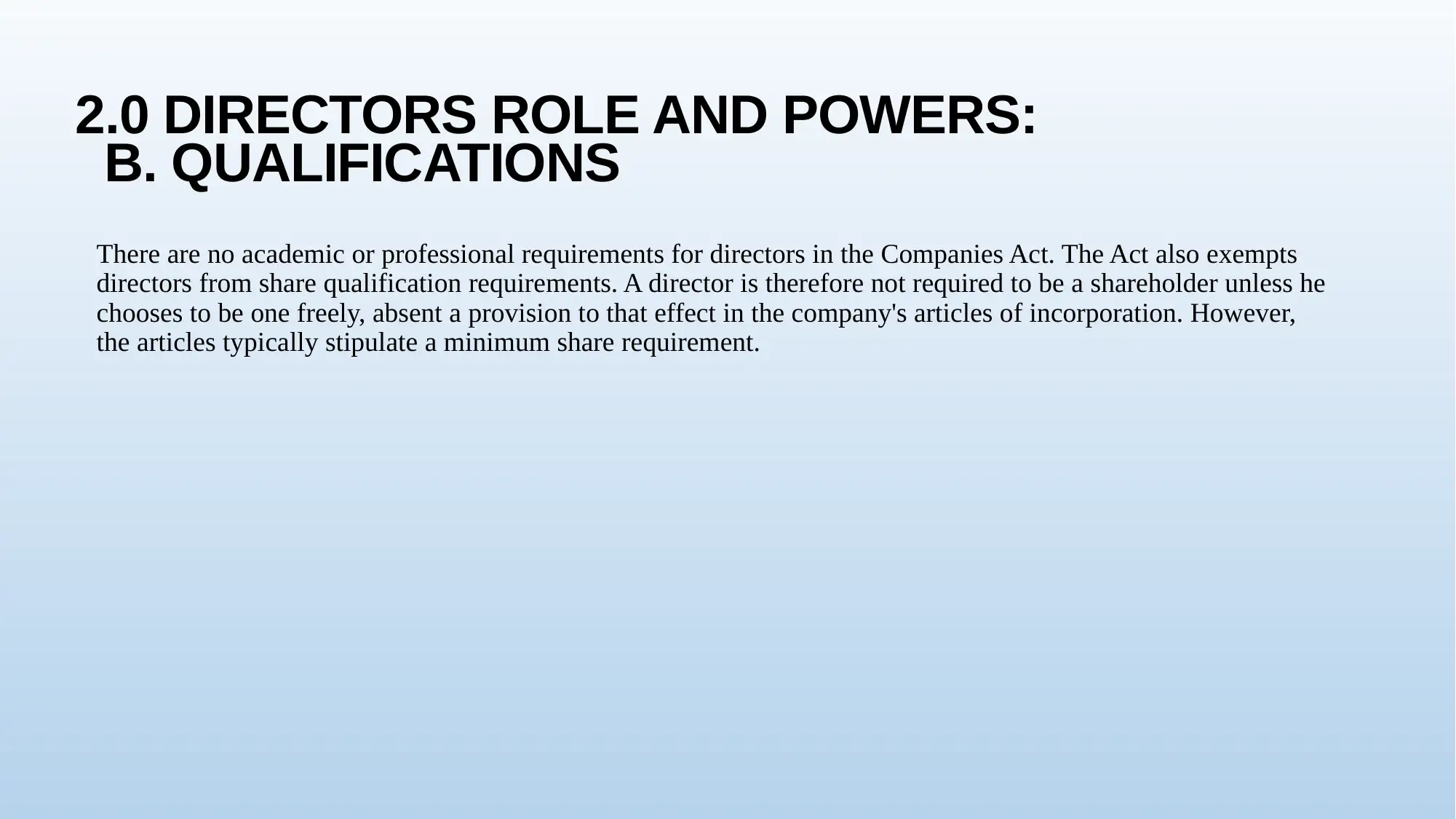
2.0 DIRECTORS ROLE AND POWERS:
B. QUALIFICATIONS
There are no academic or professional requirements for directors in the Companies Act. The Act also exempts
directors from share qualification requirements. A director is therefore not required to be a shareholder unless he
chooses to be one freely, absent a provision to that effect in the company's articles of incorporation. However,
the articles typically stipulate a minimum share requirement.
B. QUALIFICATIONS
There are no academic or professional requirements for directors in the Companies Act. The Act also exempts
directors from share qualification requirements. A director is therefore not required to be a shareholder unless he
chooses to be one freely, absent a provision to that effect in the company's articles of incorporation. However,
the articles typically stipulate a minimum share requirement.
⊘ This is a preview!⊘
Do you want full access?
Subscribe today to unlock all pages.

Trusted by 1+ million students worldwide

C. DISQUALIFICATIONS
• According to company law, a director may be disqualified for any of the following reasons:
• The judge has ruled that individual lacks mental capacity.
• Individual is insolvent.
• Person has filed for bankruptcy, and his application is currently being reviewed.
• Person has completed at least a six-month prison term after being adjudicated guilty of a crime by a court
(regardless of whether it involved moral turpitude).
• If a person has been convicted of a felony and has served at least seven years in prison, they are ineligible to
be nominated as a director for any corporation.
• According to company law, a director may be disqualified for any of the following reasons:
• The judge has ruled that individual lacks mental capacity.
• Individual is insolvent.
• Person has filed for bankruptcy, and his application is currently being reviewed.
• Person has completed at least a six-month prison term after being adjudicated guilty of a crime by a court
(regardless of whether it involved moral turpitude).
• If a person has been convicted of a felony and has served at least seven years in prison, they are ineligible to
be nominated as a director for any corporation.
Paraphrase This Document
Need a fresh take? Get an instant paraphrase of this document with our AI Paraphraser
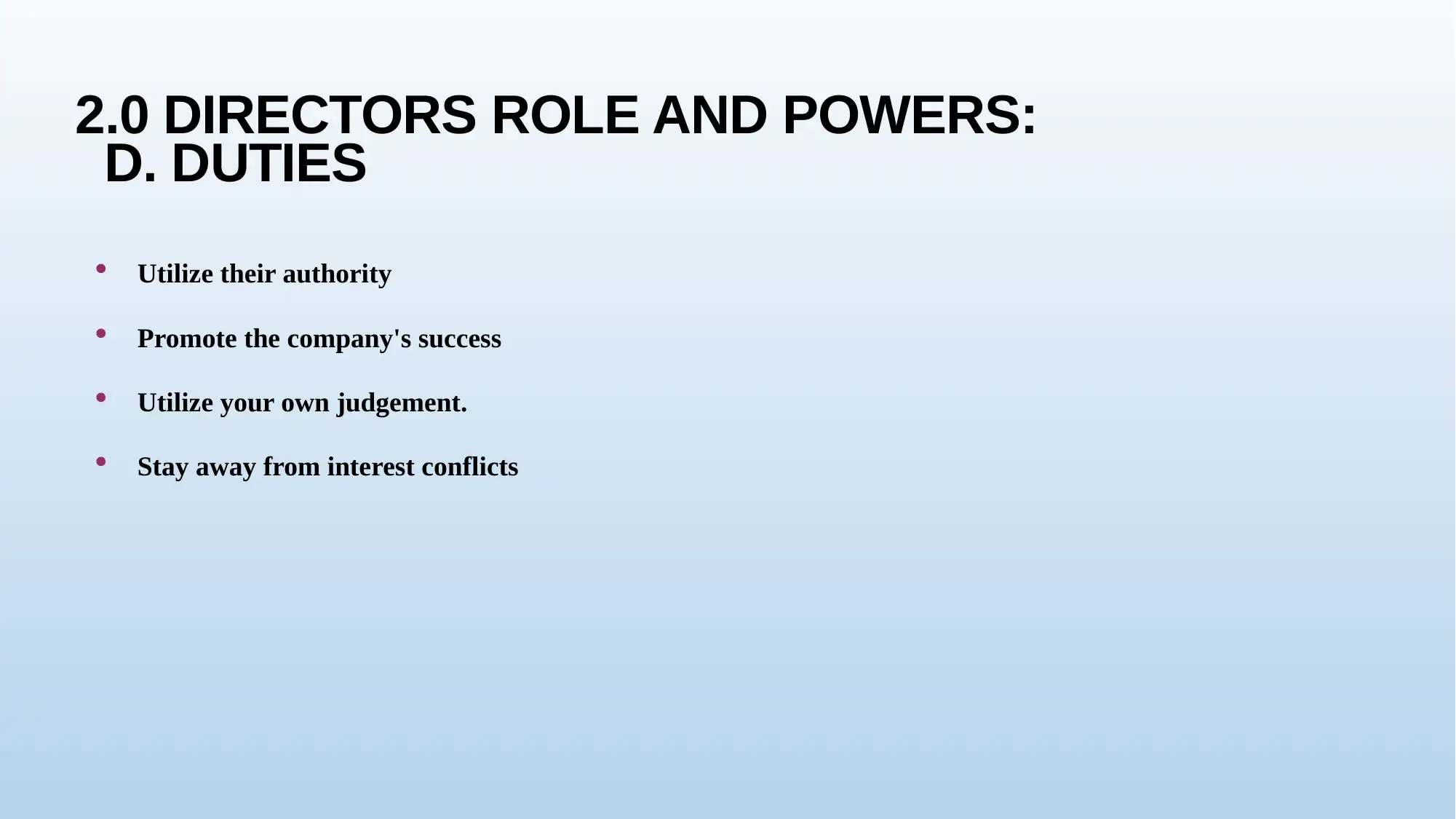
2.0 DIRECTORS ROLE AND POWERS:
D. DUTIES
Utilize their authority
Promote the company's success
Utilize your own judgement.
Stay away from interest conflicts
D. DUTIES
Utilize their authority
Promote the company's success
Utilize your own judgement.
Stay away from interest conflicts
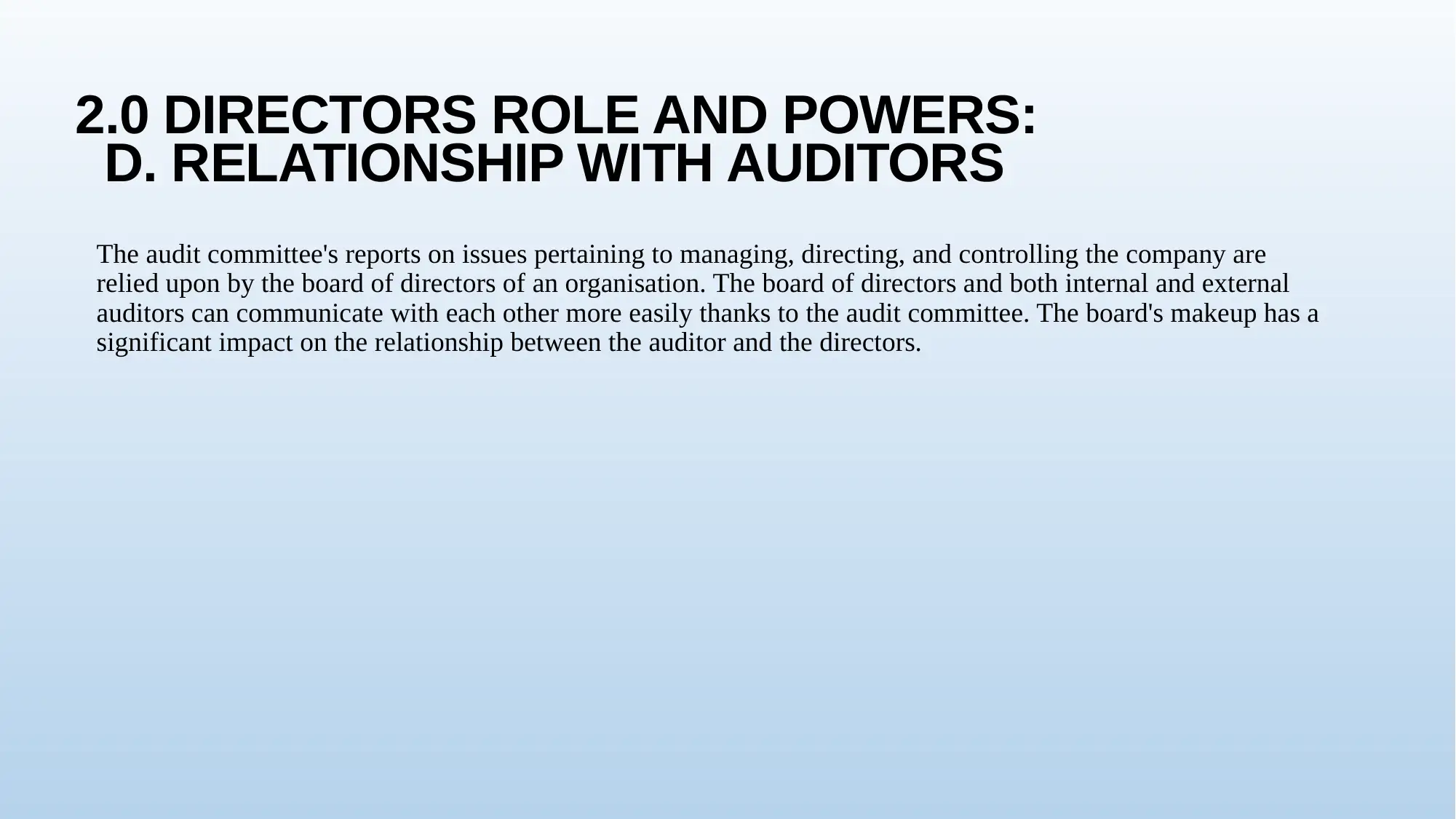
2.0 DIRECTORS ROLE AND POWERS:
D. RELATIONSHIP WITH AUDITORS
The audit committee's reports on issues pertaining to managing, directing, and controlling the company are
relied upon by the board of directors of an organisation. The board of directors and both internal and external
auditors can communicate with each other more easily thanks to the audit committee. The board's makeup has a
significant impact on the relationship between the auditor and the directors.
D. RELATIONSHIP WITH AUDITORS
The audit committee's reports on issues pertaining to managing, directing, and controlling the company are
relied upon by the board of directors of an organisation. The board of directors and both internal and external
auditors can communicate with each other more easily thanks to the audit committee. The board's makeup has a
significant impact on the relationship between the auditor and the directors.
⊘ This is a preview!⊘
Do you want full access?
Subscribe today to unlock all pages.

Trusted by 1+ million students worldwide
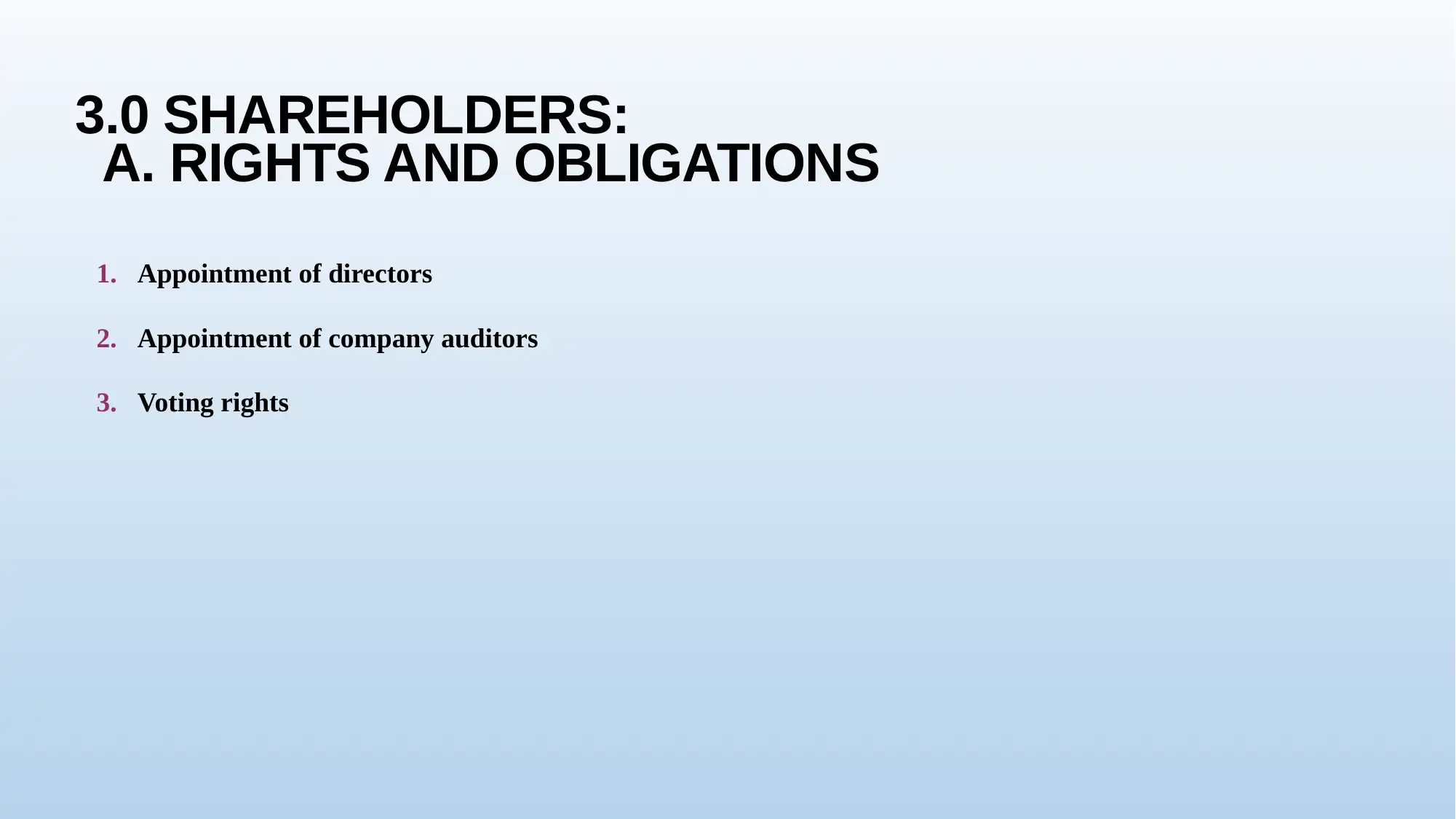
3.0 SHAREHOLDERS:
A. RIGHTS AND OBLIGATIONS
1. Appointment of directors
2. Appointment of company auditors
3. Voting rights
A. RIGHTS AND OBLIGATIONS
1. Appointment of directors
2. Appointment of company auditors
3. Voting rights
Paraphrase This Document
Need a fresh take? Get an instant paraphrase of this document with our AI Paraphraser
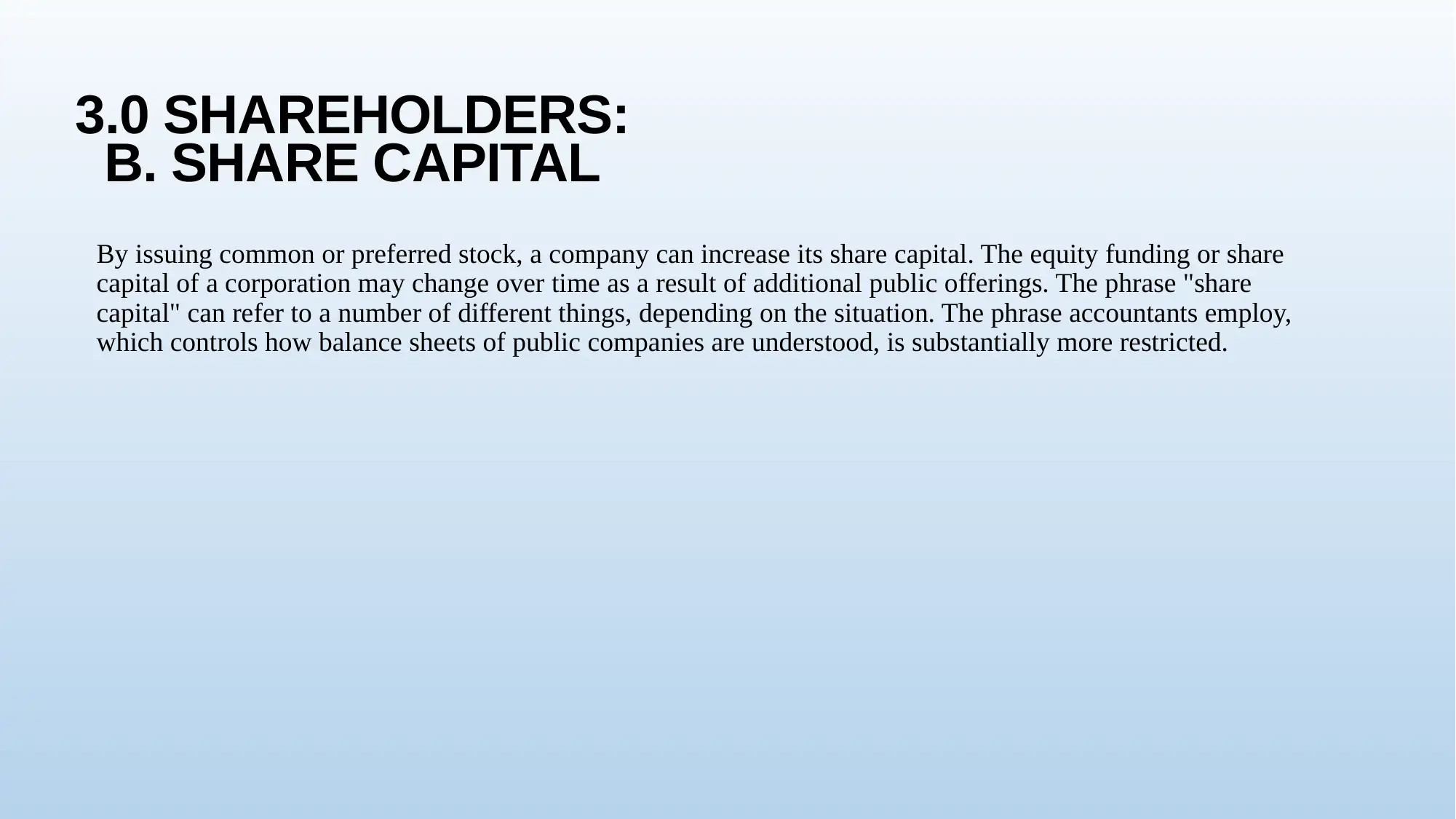
3.0 SHAREHOLDERS:
B. SHARE CAPITAL
By issuing common or preferred stock, a company can increase its share capital. The equity funding or share
capital of a corporation may change over time as a result of additional public offerings. The phrase "share
capital" can refer to a number of different things, depending on the situation. The phrase accountants employ,
which controls how balance sheets of public companies are understood, is substantially more restricted.
B. SHARE CAPITAL
By issuing common or preferred stock, a company can increase its share capital. The equity funding or share
capital of a corporation may change over time as a result of additional public offerings. The phrase "share
capital" can refer to a number of different things, depending on the situation. The phrase accountants employ,
which controls how balance sheets of public companies are understood, is substantially more restricted.
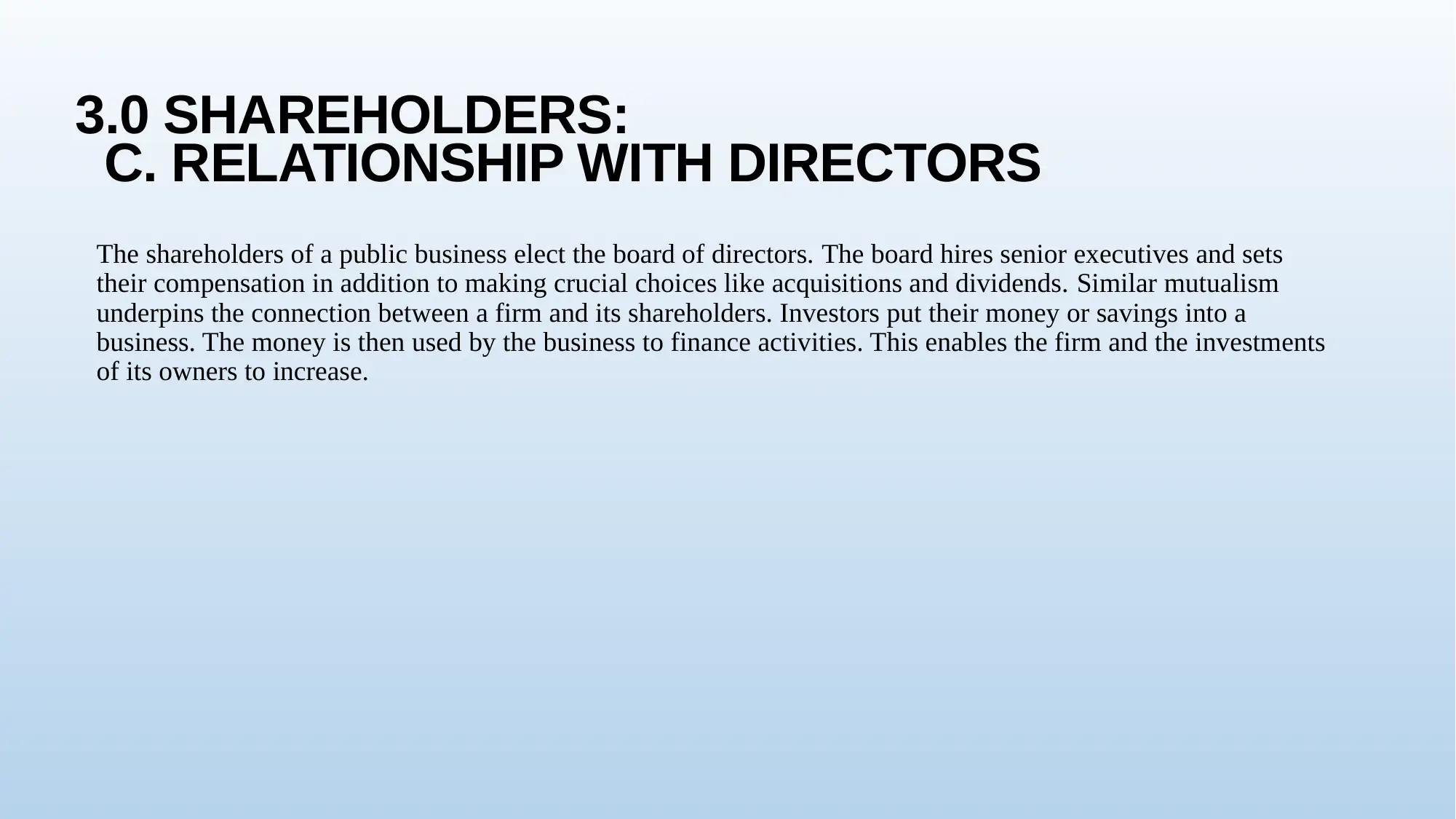
3.0 SHAREHOLDERS:
C. RELATIONSHIP WITH DIRECTORS
The shareholders of a public business elect the board of directors. The board hires senior executives and sets
their compensation in addition to making crucial choices like acquisitions and dividends. Similar mutualism
underpins the connection between a firm and its shareholders. Investors put their money or savings into a
business. The money is then used by the business to finance activities. This enables the firm and the investments
of its owners to increase.
C. RELATIONSHIP WITH DIRECTORS
The shareholders of a public business elect the board of directors. The board hires senior executives and sets
their compensation in addition to making crucial choices like acquisitions and dividends. Similar mutualism
underpins the connection between a firm and its shareholders. Investors put their money or savings into a
business. The money is then used by the business to finance activities. This enables the firm and the investments
of its owners to increase.
⊘ This is a preview!⊘
Do you want full access?
Subscribe today to unlock all pages.

Trusted by 1+ million students worldwide
1 out of 17
Related Documents
Your All-in-One AI-Powered Toolkit for Academic Success.
+13062052269
info@desklib.com
Available 24*7 on WhatsApp / Email
![[object Object]](/_next/static/media/star-bottom.7253800d.svg)
Unlock your academic potential
Copyright © 2020–2026 A2Z Services. All Rights Reserved. Developed and managed by ZUCOL.





